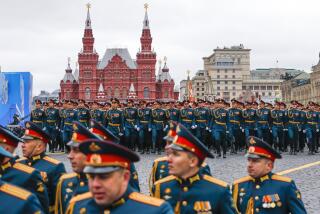Regional, Ethnic Rivalries Peril Yugoslav Unity : Europe: With Tito gone and the Communists discredited, the Belgrade government is struggling.
- Share via
BELGRADE, Yugoslavia — Like many East Europeans, Vojislav Kostunica has a democratic dream this extraordinary winter, but the dream is hostage to peril and numbing uncertainty in a nation besieged by itself.
“The idea of ‘Yugoslavia’ is vaguer today than it was at the end of World War II,” Kostunica, a political scientist, said with exasperation and perhaps a touch of perverse pride. “The political reality is complicated beyond any possible comparison.”
Kostunica is one of the founders of the new Social Democratic Party, among nearly 70 new movements hurriedly formed to contest for power against the discredited Communists, who have ruled since 1945.
But the fundamental question is not so much who will oversee Yugoslavia’s future as whether, amid fierce regional and ethnic rivalries, there will be a Yugoslavia at all.
Last week an alarmed President Janez Drnovsek urged Yugoslavia’s fractious elements to patch up their differences in talks “without previous conditions, without insults and accusations.” He decried as “very bad, even hostile,” the relations between the religious and ethnic minorities.
“This negative trend must be stopped,” he said, “because it has reached an extremely dangerous point. Nationalistic emotions among republics are being released. The nationality is more important than anything else--even more than democracy.”
Yugoslavia is made up of six republics and two autonomous provinces. There are five distinct ethnic groups, with four languages, three religions and two alphabets, all jammed into a mountainous area the size of Oregon.
For 35 years, the towering figure of Josip Broz Tito held it all together, but Tito has been dead for a decade now. Now, the regionalist chauvinism he despised rides high on cries for economic and political reform.
The 24 million diverse and mutually suspicious people of this unmelting pot wonder whether the nation formed after World War I from the shreds of rival empires can, or should, survive the century intact. A corollary is whether change, or enforced unity among people who simply do not like living together, can be achieved without great bloodshed.
“Everything that is happening is leading directly to civil war,” a commentator on Belgrade television said recently.
There was a time when Yugoslavia was the most open country in East Europe. Today, as it strives to keep pace with changes taking place in its neighbor countries, Yugoslavia’s problems seem clearer than the solutions.
There is more dynamism pulling the country apart than holding it together. A rich, Roman Catholic north--the republics of Slovenia and Croatia--and a poor, Muslim south--the autonomous province of Kosovo--are rebelling against the Serbian center.
In the rebel view, the villains are Serbia and its strongman president, Slobodan Milosevic. Serbia, which accounts for about 40% of Yugoslavia’s people, is the oldest, largest and most populous of the six republics. And it resented Tito’s policies that reduced Serbian power in the name of Yugoslav nationhood.
The populist Milosevic, denounced by non-Serbs as a demagogue, makes no secret of his determination to assert Serbian prominence. He is an economic and political conservative, and he mistrusts attempts by the weak federal government to create a modern, market-oriented economy. He does not welcome calls from Slovenes and Croats for open elections in a multi-party system.
A counterpoint to Milosevic’s commitment to centralization and orthodox communism is his self-assigned role as champion of the rights of the 3 million Serbs in minority groups outside Serbia.
One such group is in disadvantaged Kosovo, an autonomous province of 1.9 million people. Of these, 200,000 are Serbs, most of them members of the Orthodox church. Most of the people in Kosovo are Albanian and Muslim.
Milosevic stepped hard on Kosovo last year, to protect Serbians from oppression, he said. After 25 people were killed in rioting by ethnic Albanians protesting the loss of rights, Milosevic imposed emergency rule.
New unrest last month took an additional 24 lives and ended only after a massive show of force by troops sent in by the federal government.
What Serbians have done in Kosovo is regarded as insignificant in comparison with the hostility between Serbia on the one hand and Croatia and Slovenia on the other. Croatia and Slovenia were once part of the Austro-Hungarian Empire; Serbia and the rest of Yugoslavia were part of Turkey’s Ottoman Empire.
Under Tito, the restive republics enjoyed equal rights but uneven development.
Slovenia prospered. But Slovenia, where about 2 million people live, is impatient with communism on both economic and political grounds. Last year, it voted itself the right to secede, but last week the Supreme Court ruled that the vote was unconstitutional.
A two-month trade boycott between Serbia and Slovenia is winding down. Slovenia has recalled units of its police from Kosovo, and the Slovenian Communist Party has broken with the Serbian-dominated national party, proclaiming itself Social Democratic.
As regional and ethnic momentum grows, it threatens to overwhelm institutions pledged to national unity. One is the central government under the popular Prime Minister Ante Markovic.
More to Read
Sign up for Essential California
The most important California stories and recommendations in your inbox every morning.
You may occasionally receive promotional content from the Los Angeles Times.













